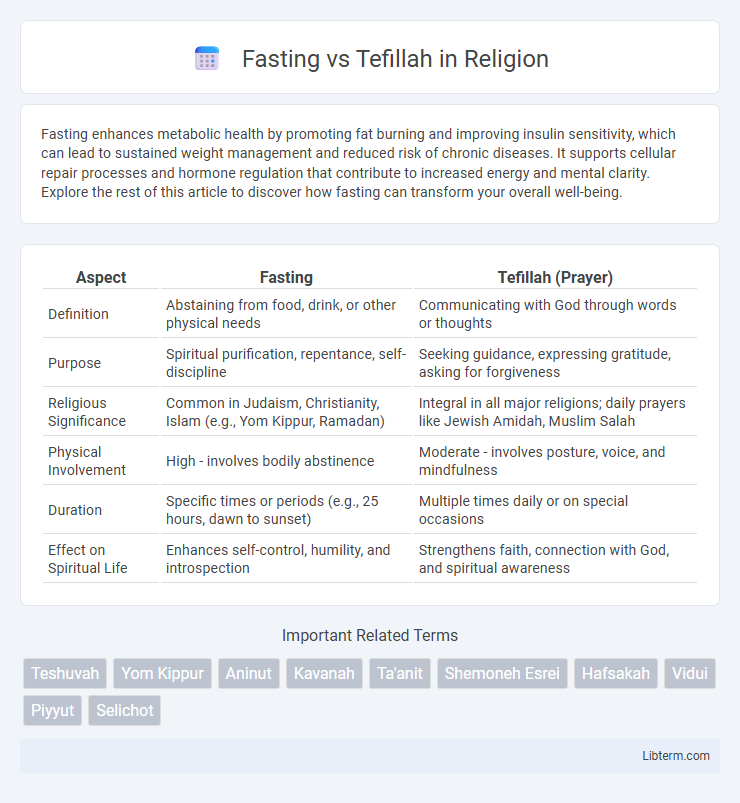Fasting enhances metabolic health by promoting fat burning and improving insulin sensitivity, which can lead to sustained weight management and reduced risk of chronic diseases. It supports cellular repair processes and hormone regulation that contribute to increased energy and mental clarity. Explore the rest of this article to discover how fasting can transform your overall well-being.
Table of Comparison
| Aspect | Fasting | Tefillah (Prayer) |
|---|---|---|
| Definition | Abstaining from food, drink, or other physical needs | Communicating with God through words or thoughts |
| Purpose | Spiritual purification, repentance, self-discipline | Seeking guidance, expressing gratitude, asking for forgiveness |
| Religious Significance | Common in Judaism, Christianity, Islam (e.g., Yom Kippur, Ramadan) | Integral in all major religions; daily prayers like Jewish Amidah, Muslim Salah |
| Physical Involvement | High - involves bodily abstinence | Moderate - involves posture, voice, and mindfulness |
| Duration | Specific times or periods (e.g., 25 hours, dawn to sunset) | Multiple times daily or on special occasions |
| Effect on Spiritual Life | Enhances self-control, humility, and introspection | Strengthens faith, connection with God, and spiritual awareness |
Understanding Fasting and Tefillah: Definitions and Origins
Fasting, derived from various religious traditions, involves abstaining from food and drink for spiritual purification and self-discipline, while Tefillah, rooted in Jewish prayer practices, signifies a direct, verbal, or silent communication with God. Both practices serve distinct but complementary roles in spiritual life, with fasting emphasizing physical restraint and Tefillah focusing on spiritual connection and reflection. The origins of fasting trace back to ancient rituals across cultures, whereas Tefillah originates from biblical commandments and rabbinic teachings, highlighting their unique yet intertwined significance in faith and devotion.
Historical Context: Fasting and Prayer in Jewish Tradition
Fasting and Tefillah hold profound significance in Jewish tradition, serving as spiritual tools rooted in biblical history and rabbinic teachings. Historically, fasting dates back to the times of Moses and the prophets, used as a means of repentance and seeking divine mercy, while Tefillah (prayer) evolved as a structured practice post-Temple era to maintain a deep connection with God. Key fast days like Yom Kippur and Tisha B'Av combine fasting with extended prayers, reflecting the intertwined role of both rituals in fostering reflection, atonement, and spiritual renewal.
Core Purposes: Why Fast? Why Pray?
Fasting serves as a physical discipline to cultivate self-control, humility, and spiritual cleansing by abstaining from food and drink, which heightens awareness of one's dependence on God. Tefillah, or prayer, functions as a direct communication channel with the Divine, fostering connection, repentance, gratitude, and guidance. Both practices aim to deepen spiritual growth and align individual intentions with divine will, but fasting emphasizes bodily sacrifice while tefillah centers on heartfelt expression and dialogue.
Spiritual Benefits of Fasting versus Tefillah
Fasting enhances spiritual awareness by fostering self-discipline and humility, creating a physical reminder of dependence on the Divine. Tefillah (prayer) directly connects the soul to God, providing immediate spiritual elevation and emotional clarity through heartfelt communication and supplication. Both practices complement each other by deepening faith, with fasting cleansing the body and mind while tefillah nurtures the soul's relationship with the Creator.
Fasting and Tefillah in Jewish Law (Halacha)
In Jewish Law (Halacha), fasting (Ta'anit) serves as a physical act of affliction and repentance, often observed on designated fast days like Yom Kippur and Tisha B'Av to atone for sins and achieve spiritual purification. Tefillah, the prayer ritual, is a central spiritual practice that complements fasting by providing a framework for introspection, confession (Vidui), and connection with God, enhancing the fasting experience. Halachic authorities emphasize that while fasting imposes bodily discipline, Tefillah activates sincere teshuvah (repentance), making both essential for achieving full spiritual rectification during periods of penitence.
Emotional and Psychological Impacts
Fasting during Tisha B'Av induces a profound sense of humility and introspection, heightening emotional awareness and spiritual connection. In contrast, Tefillah (prayer) offers comfort and hope, fostering psychological resilience through structured expression of faith and communal solidarity. Both practices serve complementary roles in emotional healing by facilitating self-reflection and promoting mental clarity.
Fasting or Tefillah: When and Why Each Is Emphasized
Fasting is emphasized primarily on specific days of mourning and repentance such as Yom Kippur and Tisha B'Av to induce physical humility and spiritual awakening. Tefillah, or prayer, is a daily practice meant to foster ongoing communication with God, express gratitude, and seek forgiveness, playing a continuous role in Jewish spiritual life. The timing of fasting is often fixed to commemorate historical events, while tefillah is emphasized during moments of personal or communal need for divine intervention.
Combining Fasting and Prayer: Enhanced Spiritual Practice
Combining fasting and tefillah creates a powerful spiritual practice that deepens self-discipline and heightens divine connection. Fasting sharpens focus and humility, while prayer channels intention and gratitude, resulting in a synergistic effect that elevates the soul. This integrated approach aligns one's body and spirit, enhancing mindfulness and transformative potential during sacred observances.
Common Misconceptions about Fasting and Tefillah
Many people mistakenly believe that fasting alone guarantees spiritual growth, overlooking the essential role of tefillah (prayer) in fostering a true connection with the Divine. While fasting purifies the body and mind, tefillah provides the framework for sincere repentance and heartfelt communication with God, making both practices integral to meaningful Jewish observance. The misconception that one can substitute fasting for tefillah undermines the complementary nature of these mitzvot in achieving personal transformation and divine closeness.
Practical Guidance: Choosing Between Fasting and Tefillah
When deciding between fasting and tefillah, consider personal spiritual goals and health conditions, as fasting traditionally serves as a physical act of repentance while tefillah fosters a direct, heartfelt connection to God. For those unable to fast, engaging in sincere, focused tefillah offers a meaningful alternative that enhances spiritual introspection and communal unity. Prioritize consistent tefillah during fast days to complement or substitute fasting, ensuring your devotion aligns with personal capacities and religious intentions.
Fasting Infographic

 libterm.com
libterm.com